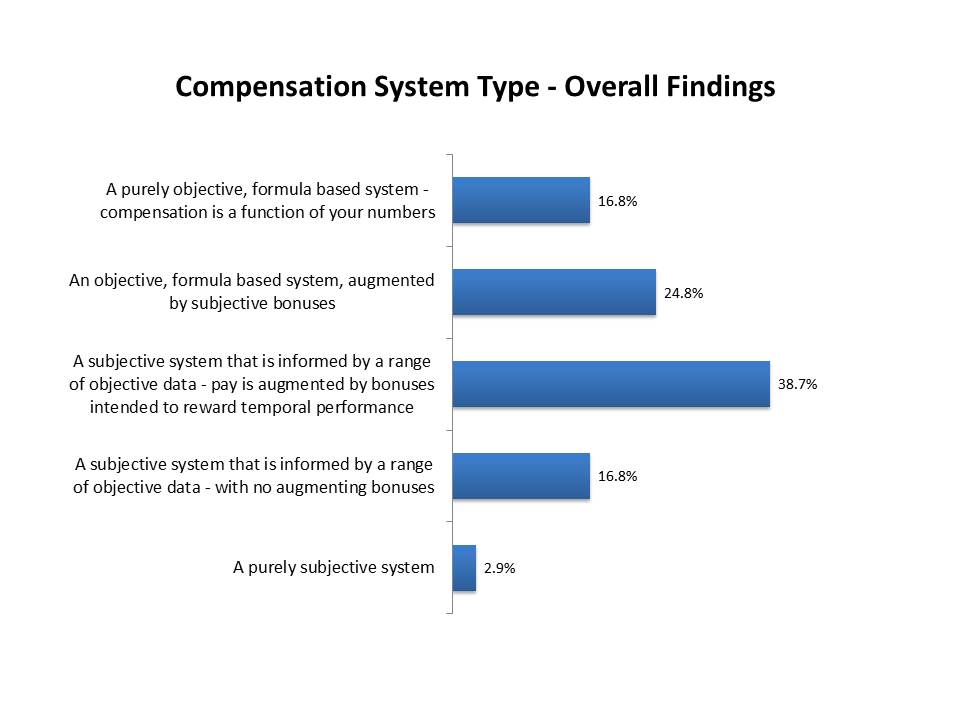In January 2014, The Managing Partner Forum, in collaboration with Sterling Strategies and TheRemsenGroup, surveyed managing partners to identify factors that drive greater (or lesser) satisfaction with partner compensation systems. 138 managing partners, mostly from mid-size US law firms, participated. The survey asked three fundamental questions:
- What type of compensation system do you have (e.g., objective versus subjective, with or without bonuses)?
- Is the compensation system and underlying data open to all partners or is it closed?
- How satisfied are your partners on balance with the compensation system?
We also asked managing partners to share the size of their respective firms to determine if firm size had an impact on overall satisfaction with partner compensation systems.
BASELINE FINDINGS
Let’s start by reviewing the baseline findings. First, well over half the firms surveyed use some type of subjective system – generally, a subjective system that is informed by objective data. Meanwhile, roughly 40% have an objective, formula-based system – though many of those systems are augmented with subjective bonuses.

The vast majority of partner compensation systems are fully open (i.e., both partner performance data and partner compensation numbers are known by all partners).

The survey sample skewed toward smaller and mid-size firms. Roughly one-third of the sample was comprised of firms with fewer than 25 attorneys. Slightly less than a third of the sample was comprised of firms with 25-50 lawyers. The remaining firms were predominantly mid-size firms in the 51-200 attorney range.

WHAT DRIVES OVERALL SATISFACTION?
We ran correlation analyses between overall satisfaction and the other three questions (i.e., with type of compensation system; with relative openness of the system; and with firm size).
The strongest correlation was between system type and satisfaction. A few insights emerge from an analysis of the relationship between the type of compensation system and overall satisfaction.
- First, though a small group in the sample, purely subjective systems lead to lower satisfaction.
- Second, adding bonuses to subjective systems that are informed by objective data (i.e., bonuses that account for short term performance blips) enhances satisfaction with those types of systems.
- Third, adding subjective bonuses to a purely objective system erodes satisfaction with those types of systems.

The correlation between the degree of openness in compensation systems and overall satisfaction is weaker. In part, this is a function of the fact that such an overwhelming majority of systems are fully open (limiting variability in the sample). However, one practice that apparently leads to a much higher level of dissatisfaction is sharing performance data, but keeping compensation data confidential.

Finally, there was a reasonably strong correlation between firm size and overall satisfaction. This was almost entirely a function of the smallest firms experiencing considerably higher levels of dissatisfaction. We will explore this in more depth in the next section.
SMALL FIRMS AND OVERALL SATISFACTION
Since the smallest firms reported the lowest levels of overall satisfaction with their partner compensation systems, it is important to look more closely at what smaller firms are doing vis-à-vis partner compensation systems.
The smallest firms are clearly outliers relative to the openness of data in their systems.
- The smallest firms were the least likely to have fully open systems (note that fully open systems exhibit the highest levels of overall satisfaction).
- In addition, the smallest firms were the most likely to share partner performance data, but keep partner compensation data under wraps. That approach to openness exhibits the highest levels of overall dissatisfaction.

In addition, smaller firms are generally (and this extends to firms in the 25-50 attorney range) more likely to use objective, formula based systems. While that is unlikely to be a determining factor in the overall satisfaction with partner compensation, it is a clear difference when comparing smaller firms to mid-size and larger firms.

Finally, higher levels of dissatisfaction with partner compensation in the smallest firms may be a simple function of scale. Namely, in a smaller firm, a couple of vocally dissatisfied partners can lead to a feeling of widespread discontent. Those same two or three people have less and less impact on the overall feelings of satisfaction as the partnership gets larger.
MPF RECOMMENDATIONS TO FIRM LEADERS
Law firm compensation systems vary widely and there is no “right” or “perfect” system for your firm. Much depends on firm history, culture, leadership and trust levels among the partners. Generally, we offer the following advice:
Look Beyond the Numbers
The numbers (billable hours, collections, originations, etc.) are good place to start, but if that’s all you look at, lawyers will very quickly figure that out and work to “game” the system. Strictly formulaic systems have a tendency to encourage hoarding and control which can lead to a breakdown of trust among partners over time.
Measure and Reward “Firm-First” Actions and Behaviors
If you’re truly running a firm (as opposed to a loose confederation of sole practitioners) it’s important to find ways to measure and reward firm citizenship, sharing, teamwork, mentoring and the like.
Reward Investment (aka Non-Billable) Time
How does your firm reward its managing partner, its practice group leaders, its department heads and its committee chairs for a job well done? Does it have job descriptions for these important roles? Does it track the time devoted to them? Are there any rewards for a job well done? Many firms don’t even track it, much less reward it.
Does One-Size Fit All?
More often than not, law firms measure each partner’s performance and contributions based on the same measuring stick. Rather, we suggest that you identify each partner’s highest and best use to the firm (i.e. rainmakers, department heads, committee chairs), ask them to set goals that maximize the value playing that role will bring to the firm, and reward them for achieving those goals.
Be Fair. Be Transparent.
Whatever system your firm uses, we believe that perceived fairness and transparency among the partners is critically important. Most partners want to know the rules and that they are being fairly applied.
Communicate the Process
Although this survey didn’t address it, we also encourage most firms to adopt an open, clearly understood process. Put in writing. Follow it. Be consistent. Doing so builds trust in the system, as well as those who lead and administer the process.
You Get What You Pay For
If it’s just the numbers, lawyers will play to that. If you want to see more sharing, teamwork and cross-selling, find ways to measure and reward these desired behaviors. If you want lawyers to market, mentor and train associates, find ways to factor these contributions into the mix.
“Objectify” the Subjective Stuff
There are many things your firm can do to try to make subjective contributions more objective. For example, if mentoring is important, ask the associates to rate each partner on mentoring and factor it into the system. If showing up at meetings is important, track attendance and include that into the mix. If business development is important, track the time partners invest in individual marketing plans. Develop job descriptions for important leadership roles and reward those who meet or exceed expectations. Ask each partner to write and submit a self-evaluation. Have each partner rank the others in terms of both financial and non-financial contributions.
ABOUT THE SURVEY METHODOLOGY
The survey was hosted online and all responses were anonymous and confidential. Only managing partners (and like titled law firm leaders) were invited to participate. Invitations were sent via the Managing Partner Forum. The survey was open from January 7, 2014 through January 22, 2014. In total 138 responses were received.
# # #
ABOUT THE AUTHORS

John Sterling is the founding partner of Sterling Strategies, a firm focused on strategic planning, strategy development, and related implementation management. More information about John Sterling and Sterling Strategies is available at www.sterlingstrat.com.

John Remsen, Jr. is President and CEO of The Managing Partner Forum, the country’s premiere resource for managing partners and law firm leaders. He is also President of TheRemsenGroup, one of the country’s leading consulting firms for mid-size law firms. He can be reached at 404.885.9100 or JRemsen@ManagingPartnerForum.org.
© 2014, Managing Partner Forum


Click on link below for PDF version of this article.



















